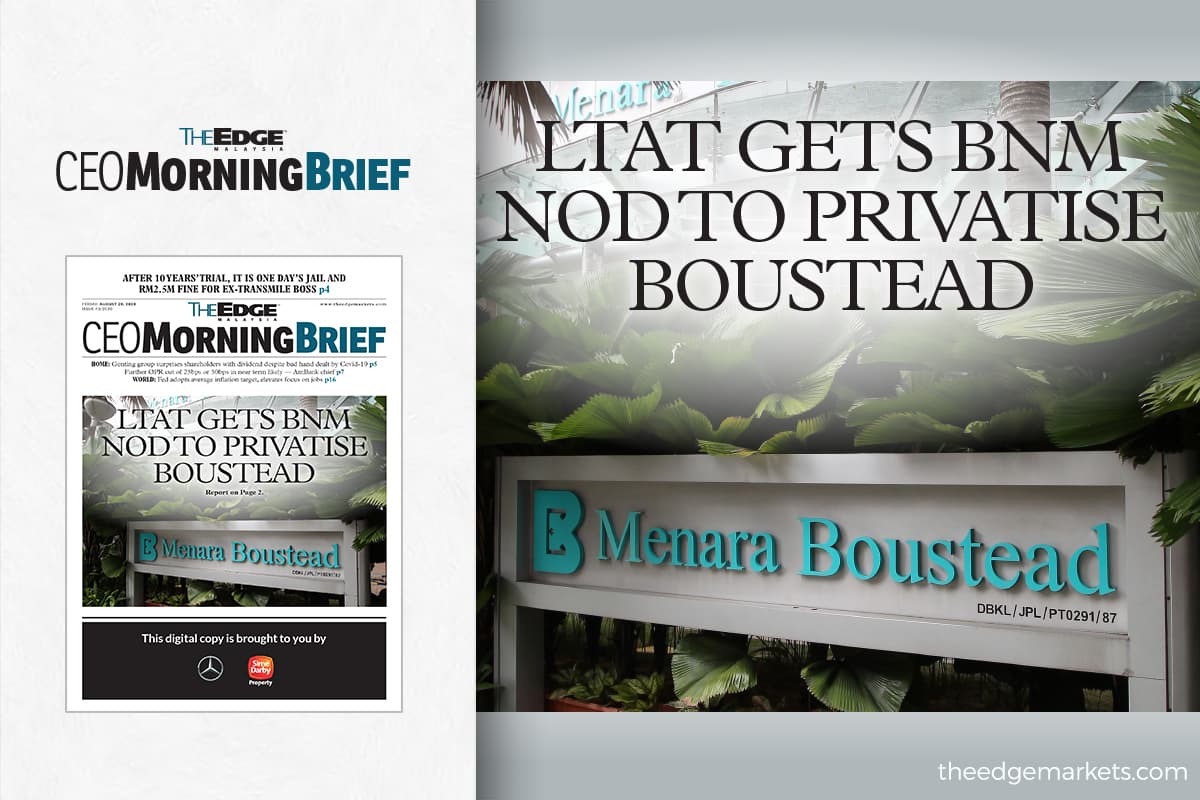
KUALA LUMPUR (Aug 27): The Armed Forces Fund Board (LTAT) has confirmed theedgemarkets.com report that it has received the nod from Bank Negara Malaysia (BNM) for its proposal to privatise its 59.44%-owned outfit Boustead Holdings Bhd
In an announcement, LTAT said it received a letter from the central bank saying it had no objections for LTAT to commence negotiations with Boustead, which holds an equity stake in Affin Bank Bhd, on the proposal.
Earlier, Boustead announced that it has received a notice from LTAT, whereby the army fund said it had been granted more time by the Securities Commission Malaysia (SC) to announce its firm intention in relation with the proposed privatisation at an indicative price of 80 sen per share.
Based on the indicative price, the proposed privatisation exercise would cost LTAT around RM660 million. The indicative offer price represents 45% of Boustead’s net asset of RM1.76 per share as at end-June 2020. It is 14.5 sen or 22.14% higher than the counter’s last closing price of 65.5 sen.
The SC had on July 24 approved LTAT’s application for an extension until Oct 27.
On May 28, LTAT confirmed that it is considering taking Boustead private at an indicative price of 80 sen per share, although it also stated that “there can be no certainty” that it will proceed with the proposal.
“We wish to highlight that notwithstanding the above, the proposal is still subject to other regulatory approval(s) required for the proposal and this notification does not amount to a firm intention that we will undertake the proposal,” said LTAT.
Boustead holds equity interest in four public-listed companies — Affin Bank Bhd, Boustead Plantations Bhd, Boustead Heavy Industries Corp Bhd (BHIC) and Pharmaniaga Bhd. Its parent LTAT also holds a stake in all the four companies.
News about LTAT’s offer came at a time when Boustead got caught in the back foot by COVID-19, at the start of its three-year turnaround plan that commenced with the RM1.15 billion kitchen-sinking exercise in the fourth quarter ended Dec 31, 2019 (4QFY19).
The path towards profitability was halted, with Boustead posting a net loss of RM73.7 million or 3.64 sen per share for the second quarter ended June 30, 2020 (2QFY20), as the pandemic brought more pain than gain for its business segments.
The net loss was flattish when compared with the RM73.1 million net loss reported in 1QFY20, while revenue fell 33.69% to RM1.5 billion from RM2.26 billion.
The flattish bottom line comparison was supported by growth in its pharmaceutical business and plantation, while losses widened in three segments — property and industrial, heavy industries, and trading, finance and investment.
On a year-on-year basis, Boustead’s swing to loss in 2QFY20 compares to a net profit of RM24.3 million and earnings per share of 1.2 sen in 2QFY19, buoyed by a net gain on disposal of its plantation assets at that time.
Revenue, meanwhile, was down by 41% when compared with RM2.54 billion reported in 2QFY20, again as all segments slipped except for plantation and pharmaceutical divisions.
For the six-month period ended June 30 (6MFY20), Boustead booked a net loss of RM146.7 million from a net profit of RM1.9 million a year earlier, while revenue fell 25.5% to RM3.76 billion from RM5.05 billion.
In a statement, Boustead chairman Datuk Seri Mohamed Khaled Nordin said the group had been hit mostly in the domestic-oriented and tourism-related segments.
“However, on an encouraging note, towards the end of the second quarter, all of the group’s businesses were able to resume.
“As the nation is currently in the Recovery MCO phase, the group is optimistic that the situation will see a gradual improvement and we will continue to monitor ongoing developments,” Khaled said.
He added: “Concurrently, we remain focused on our three-year Transformation Plan, EDGE20, which aims to transform the group into a high-performing and sustainable organisation. This will allow us to navigate the current challenges and set a course for the group to embark on brighter prospects over the long term.”